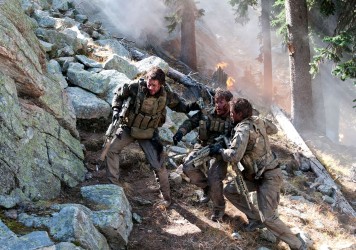Peter Berg and Mark Wahlberg’s latest collaboration is an exploration of American militarism that doesn’t quite work.
We don’t all need to agree that Peter Berg’s last three films were great to recognise that they demonstrated the director’s knack for action filmmaking. The muddled Lone Survivor was an impressive training ground for his next two films, establishing not only his interest in real-life stories, but also his keen eye for spatial coherence, lacking in much action cinema. Practically stripped of the director’s usual muddled political concerns, Deepwater Horizon came closer to a pure definition of the action movie, and was all the more thrilling for it, featuring some of the most impressive special effects of recent years. In Patriots Day, Berg applied his attention to detail and his clarity to a recreation of the manhunt for the Boston bombers, to deeply engaging effect.
Mile 22 seems like a conscious attempt to try something new, and in many respects the film is drastically opposed to the tried and tested Peter Berg formula. Although the CIA Ground Branch division that the film is focused on does indeed exist, the bonkers story we are told isn’t taken from real life – though it does contain crass references to real politics. The film opens somewhere in the US on the division, headed by Mark Wahlberg’s James Silva, infiltrating a house occupied by Russian spies hoarding some dangerous toxic substance.
Yet this isn’t a ’90s Hollywood movie. Rather, Mile 22 sketches a version of America imbued by current anxieties around Russian meddling in the presidential election and other such secret involvement. On Berg’s own admission, the erratic and temperamental Silva is directly based on none other than Steve Bannon, the ‘mastermind’ behind Trump’s ascent to power. Silva was uncommonly smart as a child and is now suspected to suffer from some kind of untreated mental illness, but the resemblance to Bannon and Trump extends further, into his own view of international relations. The Ground Branch he works for is only sent on a mission when neither diplomacy nor military intervention have succeeded – their only priority is the mission, and unlike other forces, they do not have to keep subjects alive.
By virtue of this principle, the usual suspense in watching a team of armed people enter a dangerous place without killing unarmed people is completely gone, replaced with utter terror: the cold-blooded agents do not hesitate to kill. The film’s opening scene ends with Silva’s brutal, needless murder of a young man, setting up the film’s relentlessly hysterical tone.
But this licence to kill, as extreme and shocking as it is, has a deadening effect on proceedings. What are the stakes? This black-and-white hysteria is complicated by the division’s next mission, 16 months later, of protecting an Indonesian police officer (The Raid’s Iko Uwais) offering information about the rest of the missing toxic substance. The mysterious, handsome, almost perpetually silent officer only demands to be extradited to America, and the division is charged to protect him on the 22 miles separating the American embassy from the airport.
This proves more complicated than planned, with the Indonesian government secretly opposing this operation and attempting to murder the officer. Uwais’ martial arts abilities quickly come into use, and are as delightful to watch as ever. But the juxtaposition of these extremely impressive skills, and of Wahlberg’s trigger-happy attitude is jarring and confusing. The film seems unable to reconcile these completely different forms of violence, and the contrasting registers they evolve in.
It’s as though Berg, usually an expert at grounding every element he works with into reality, here seems to let Silva’s hysterical thinking imbue the very structure of the film. Bannon probably wouldn’t find Uwais’ character implausible at all. This sense of chaos, uncharacteristic of Berg’s work, even affects the action sequences, and what is a rather straightforward shootout in the middle of a busy intersection becomes confusing bloodshed.
Most bewildering of all is the film’s tone. Wahlberg – whose presence in Berg’s three previous films was always their weakest point – takes centre stage here, and plays such an unlikeable and annoying character that it is impossible to believe we are supposed to be on his side. The film’s violent finale does suggest that he was the bad guy all along, but while this could make for an interesting experiment for the director, it does not translate into an enjoyable experience for the viewers.
Often perceived as the most straightforwardly pro-American and pro-military of directors, Berg has been discreetly complicating this cliche in all his collaborations with Wahlberg. His decision to set his most unforgiving exploration of American militarism within an undeniably commercial register is sadly most valuable as a failed experiment.
Published 20 Sep 2018
Peter Berg’s last three films were all thrilling and fascinating.
Confusing mayhem.
An interesting experiment but not a successful one.

By Elena Lazic
Mark Wahlberg and director Peter Berg combine forces for this rousing reenactment of the Boston Marathon bombing.

There are nuggets of honesty amid the gung-ho jingoism in Peter Berg’s starry-eyed war story.

By Elena Lazic
Peter Berg puts a blue-collar spin on the 2010 BP oil spill in this immensely entertaining disaster epic.